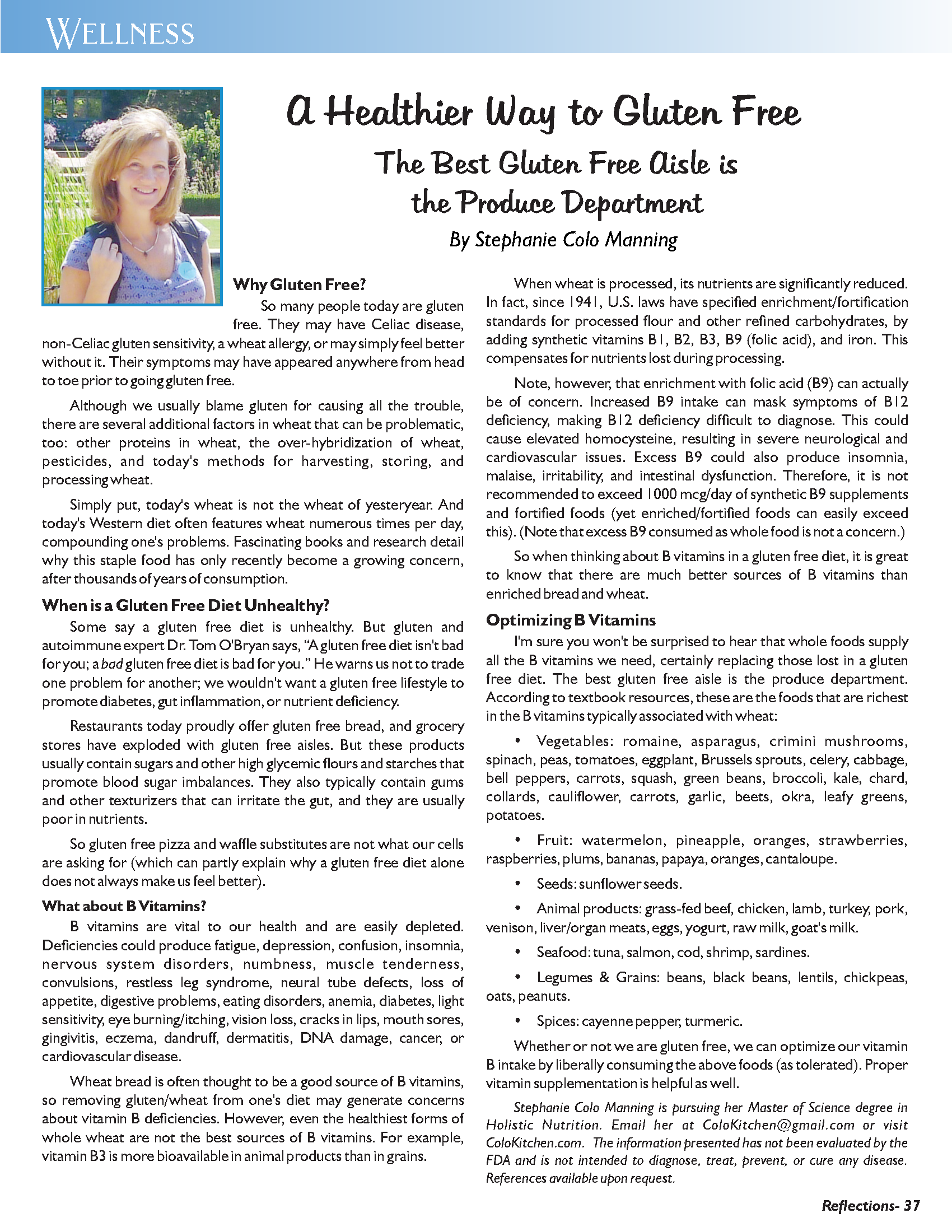A Healthier Way to Gluten Free, Summer 2019
By Stephanie Colo Manning
Why Gluten Free?
So many people today are gluten free. They may have Celiac disease, non-Celiac gluten sensitivity, a wheat allergy, or may simply feel better without it. Their symptoms may have appeared anywhere from head to toe prior to going gluten free.
Although we usually blame gluten for causing all the trouble, there are several additional factors in wheat that can be problematic, too: other proteins in wheat, the over-hybridization of wheat, pesticides, and today’s methods for harvesting, storing, and processing wheat.
Simply put, today’s wheat is not the wheat of yesteryear. And today’s Western diet often features wheat numerous times per day, compounding one’s problems. Fascinating books and research detail why this staple food has only recently become a growing concern, after thousands of years of consumption.
When is a Gluten Free Diet Unhealthy?
Some say a gluten free diet is unhealthy. But gluten and autoimmune expert Dr. Tom O’Bryan says, “A gluten free diet isn’t bad for you; a bad gluten free diet is bad for you.” He warns us not to trade one problem for another; we wouldn’t want a gluten free lifestyle to promote diabetes, gut inflammation, or nutrient deficiency.
Restaurants today proudly offer gluten free bread, and grocery stores have exploded with gluten free aisles. But these products usually contain sugars, high glycemic flours, and starches that promote blood sugar imbalances. They usually contain gums and other texturizers that can irritate the gut, and are poor in nutrients.
So, gluten free pizza and waffle substitutes are not what our cells are asking for (partly explaining why a gluten free diet alone does not always make us feel better).
What about B Vitamins?
B vitamins are vital to our health and are easily depleted. Deficiencies could produce fatigue, depression, confusion, insomnia, nervous system disorders, numbness, muscle tenderness, convulsions, restless leg syndrome, neural tube defects, loss of appetite, digestive problems, eating disorders, anemia, diabetes, light sensitivity, eye burning/itching, vision loss, cracks in lips, mouth sores, gingivitis, eczema, dandruff, dermatitis, DNA damage, cancer, or cardiovascular disease.
Wheat bread is often thought to be a good source of B vitamins, so removing gluten/wheat from one’s diet may generate concerns about vitamin B deficiencies. However, even the healthiest forms of whole wheat are not the best sources of B vitamins. For example, vitamin B3 is more bioavailable in animal products than in grains.
When wheat is processed, its nutrients are significantly reduced. In fact, since 1941, U.S. laws have specified enrichment/fortification standards for processed flour and other refined carbohydrates, by adding synthetic vitamins B1, B2, B3, B9 (folic acid), and iron. This compensates for nutrients lost during processing.
Note, however, that enrichment with folic acid (B9) can actually be of concern. Increased B9 intake can mask symptoms of B12 deficiency, making B12 deficiency difficult to diagnose. This could cause elevated homocysteine, resulting in severe neurological and cardiovascular issues. Excess B9 could also produce insomnia, malaise, irritability, and intestinal dysfunction. Therefore, it is not recommended to exceed 1000 mcg/day of synthetic B9 supplements and fortified foods (yet enriched/fortified foods can easily exceed this). (Note that excess B9 consumed as whole food is not a concern.)
So when thinking about B vitamins in a gluten free diet, it is great to know that there are much better sources of B vitamins than enriched bread and wheat.
Optimizing B Vitamins
I’m sure you won’t be surprised to hear that whole foods supply all the B vitamins we need, certainly replacing those lost in a gluten free diet. The best gluten free aisle is the produce department! According to textbook resources, these are the foods that are richest in the B vitamins typically associated with wheat:
- Vegetables: romaine, asparagus, crimini mushrooms, spinach, peas, tomatoes, eggplant, Brussels sprouts, celery, cabbage, bell peppers, carrots, squash, green beans, broccoli, kale, chard, collards, cauliflower, carrots, garlic, beets, okra, leafy greens, potatoes.
- Fruit: watermelon, pineapple, oranges, strawberries, raspberries, plums, bananas, papaya, oranges, cantaloupe.
- Seeds: sunflower seeds.
- Animal products: grass-fed beef, chicken, lamb, turkey, pork, venison, liver/organ meats, eggs, yogurt, raw milk, goat’s milk.
- Seafood: tuna, salmon, cod, shrimp, sardines.
- Legumes & Grains: beans, black beans, lentils, chickpeas, oats, peanuts.
- Spices: cayenne pepper, turmeric.
Whether or not we are gluten free, we can optimize our vitamin B intake by liberally consuming the above foods (as tolerated). Proper vitamin supplementation is helpful as well.
Stephanie Colo Manning holds a Master of Science degree in Holistic Nutrition. The information presented has not been evaluated by the FDA and is not intended to diagnose, treat, prevent, or cure any disease. References available upon request.

